Overview
In the demanding world of healthcare, providers often face emotional challenges that can weigh heavily on their practice. Administrative tasks can become overwhelming, detracting from the time and energy that should be devoted to patient care. This article presents ten free therapy notes template options designed to enhance documentation efficiency, allowing therapists to refocus on what truly matters—their patients.
These templates not only streamline administrative tasks but also emphasize the importance of structured documentation methods, such as SOAP and DAP. By adopting these practices, healthcare providers can improve treatment outcomes and alleviate some of the burdens they face. Imagine a world where documentation feels less like a chore and more like a supportive tool in your practice.
Here are some key benefits of utilizing these templates:
- Enhanced efficiency in documentation, freeing up time for patient interactions.
- Improved treatment outcomes through structured methods that foster clarity and focus.
- Reduced administrative burdens, allowing for a more nurturing approach to patient care.
As you explore these options, consider how they can transform your daily practice. Embracing structured documentation can lead to a more fulfilling experience for both you and your patients. Take a moment to reflect: how much more could you achieve if administrative tasks were simplified? We encourage you to engage with these resources and discover the difference they can make in your therapeutic journey.
Introduction
In the world of therapy, practitioners often find themselves weighed down by administrative tasks, which can detract from their true mission: delivering exceptional care to their clients. The emergence of free therapy notes templates offers a beacon of hope, providing not just efficient documentation but also a chance to reclaim valuable time and focus. Yet, with so many options available, how can therapists identify which templates genuinely enhance their practice and improve patient outcomes? This article explores ten standout free therapy notes templates that promise to streamline documentation and elevate the therapeutic experience.
As healthcare providers, the emotional challenges can be overwhelming. The burden of paperwork often distracts from the meaningful connections with clients. Imagine the relief of having a structured system that allows you to focus on what truly matters—your clients' well-being. By implementing these templates, you can not only reduce stress but also enhance the quality of care you provide.
Let’s delve into these ten templates that can transform your documentation process. Each one is designed to support your practice, ensuring that you can dedicate more time to your clients and less to administrative tasks. Together, we can navigate this journey toward improved efficiency and enriched therapeutic experiences.
CosmaNeura: Comprehensive AI-Powered Therapy Notes Templates
Healthcare providers often face overwhelming emotional challenges, burdened by administrative tasks that can detract from their primary focus—caring for patients. CosmaNeura understands this struggle and provides a variety of powered by AI, specifically designed for you. The free therapy notes template helps , including:
- Appointment scheduling
- Medical record management
This allows you to dedicate more time to delivering .
Imagine the relief of having that not only ease your workload but also comply with healthcare standards. By integrating AI technology, that you can , recovering valuable time in your day. This automation is not just a convenience; it’s an essential resource that enhances patient care through .
Take a moment to reflect on how much more fulfilling your practice could be with these tools at your disposal. With CosmaNeura’s templates, you can focus on what truly matters—your patients. Embrace the opportunity to , making each interaction more meaningful. Reach out today to discover how these templates can support you in your vital work.
SOAP Notes Template: Structured Documentation for Effective Therapy
In the demanding world of healthcare, practitioners often face emotional challenges that can impact their ability to provide the best care. The , based on the , emerges as a crucial ally, offering a structured way to ensure precise documentation of client interactions. By organizing information into these four distinct sections, therapists can comprehensively capture all relevant details of each session, alleviating some of the they encounter.
This structured approach not only enhances treatment planning but also promotes continuity of care—an essential aspect of . Research indicates that effective record-keeping can reduce medical errors by up to 25% and enhance patient outcomes by 20-30%, as noted in various studies. Imagine the peace of mind that comes from knowing your documentation practices directly contribute to improved .
Moreover, , like utilizing SOAP entries, have been shown to result in 15-20% fewer rejected insurance claims due to , particularly in therapy environments. This means less time spent on administrative tasks and more time dedicated to what truly matters: the patients. As one counselor, Cynthia Moreno Tuohy, beautifully stated, 'Organized records enable me to concentrate on what genuinely counts—my patients.'
By adopting with SOAP records, therapists can elevate their documentation methods, ultimately leading to . However, it’s important to recognize that while SOAP records are widely utilized, they do have limitations. Potential challenges include disorganization and the absence of sections addressing changes over time.
Created by Dr. Lawrence Weed nearly 50 years ago, the SOAP framework continues to be a fundamental tool in clinical documentation. As you reflect on your own practices, consider how embracing this structured approach could , fostering a deeper connection and understanding in your care.
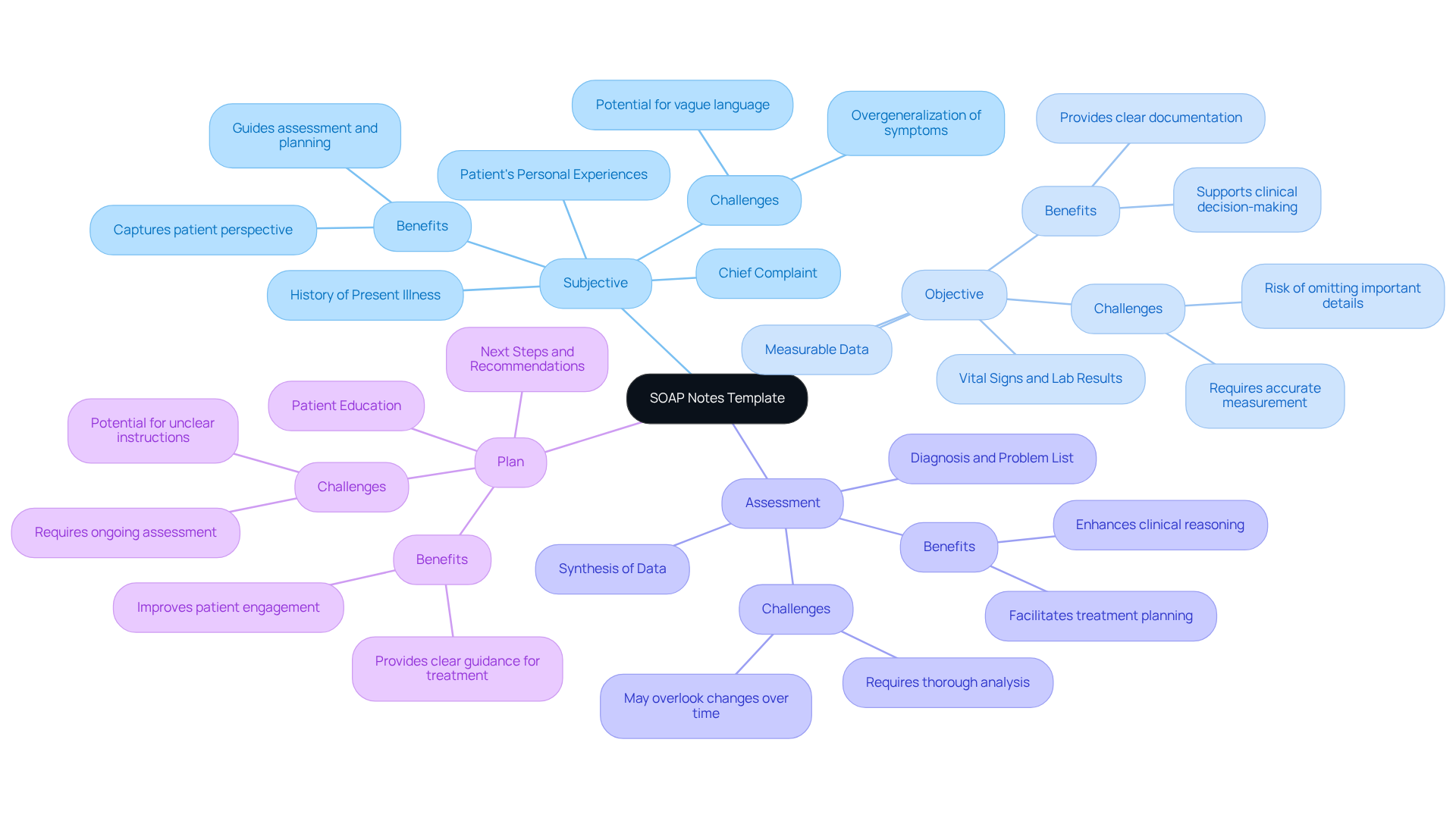
BIRP Notes Template: Documenting Behavioral Interventions and Responses
The BIRP (Behavior, Intervention, Response, Plan) notes template is an invaluable tool for healthcare providers navigating the complexities of patient care. Have you ever felt overwhelmed by the need to document and their responses? This organized format not only simplifies this task but also allows you to assess the effectiveness of your interventions. By facilitating prompt modifications to based on immediate feedback, you can truly make a difference in your patients’ lives.
Research shows that can lead to significantly improved participant outcomes. Studies have demonstrated that effective tracking fosters enhanced engagement and satisfaction in therapy. Imagine the impact of using —each session can be , creating a more responsive and flexible therapeutic environment.
Moreover, utilizing BIRP records aligns with . It underscores the importance of organized documentation in achieving positive therapeutic outcomes. Free for BIRP records are readily available, providing you a streamlined method for capturing vital information. This not only improves the overall but also alleviates some of the that can weigh heavily on healthcare providers.
By embracing this approach, you are taking a significant step toward enhancing your practice and supporting your clients more effectively. Are you ready to explore how BIRP can transform your documentation process and ultimately benefit those you serve?
DAP Notes Template: Concise Documentation for Therapy Sessions
serves as a that offers a . Emerging in the 1980s, this streamlined recording technique was designed for mental health professionals, emphasizing essential components—information gathered during the session, the clinician's evaluation, and the strategy ahead. This format assists practitioners in maintaining clarity and efficiency in their records, ultimately enhancing the provided to clients.
Have you ever felt overwhelmed by the that take time away from patient care? Studies reveal that brief records can significantly enhance therapy effectiveness, allowing professionals to focus more on what truly matters—prioritizing patient care. For instance, many who utilize DAP records report a decrease in time spent on documentation, enabling them to allocate more resources to direct client engagement. A study found that professionals employing DAP records saved an average of 30% more time compared to traditional documentation methods.
Key elements of DAP notes include:
- Data: This section captures observable information and client-reported symptoms, ensuring that all relevant details are documented accurately.
- Assessment: Here, therapists interpret the data, reflecting on the client's progress and any concerns regarding their mental health.
- Plan: This outlines , including therapeutic interventions and homework assignments.
The benefits of extend beyond mere efficiency. They fulfill medical necessity documentation requirements set by insurance providers, ensuring that services are reimbursed without complications. Additionally, the transparency of DAP records fosters communication among clinical team members, simplifying the understanding of a patient's status and treatment path.
Including client quotes in DAP records can further enhance their effectiveness, offering valuable insight into individuals' thoughts and emotions, which is crucial for monitoring progress over time. A mental health expert once remarked, 'Employing brief records not only conserves time but also enhances the therapeutic connection by affirming individuals' experiences.'
Consider the case of Marissa Moore, a licensed mental health expert with over 11 years of experience. By embracing DAP documentation, she improved her workflow, allowing her to focus more on her clients' needs while adhering to record standards. Marissa shared that [utilizing DAP records](https://mentalyc.com/blog/dap-notes) helped her reduce recording time by 40%, enabling her to engage more deeply with those she serves.
In conclusion, the free therapy notes template is a supportive tool for therapists aiming to . Its structured approach not only promotes efficiency but also nurtures the delivery of high-quality care. Are you ready to explore how DAP notes can transform your practice and improve the lives of your clients?
Progress Notes Template: Tracking Patient Progress Effectively
s are essential tools that support a person's development throughout therapy. They offer a comprehensive overview of the individual's journey, capturing significant changes, challenges, and achievements that are essential for ongoing treatment planning and evaluation. However, have you considered the emotional toll that inconsistent documentation can take on both clinicians and patients? Research reveals that only 24.6% of clinicians regularly use , while a concerning 61.5% never use them consistently. This gap in practices can hinder the .
Including not only enhances the therapeutic narrative but also validates the individual's perspective, fostering a stronger bond between the practitioner and the individual. As one counselor insightfully noted, 'Quoting your patients directly in can be incredibly impactful.' This practice deepens our understanding of patients' presenting issues and facilitates more personalized treatment plans.
Moreover, effective documentation is crucial for . Therapists who utilize a free therapy notes template often report . By prioritizing detailed progress records, clinicians can ensure they are not merely documenting care but actively participating in the therapeutic process. This commitment ultimately leads to improved outcomes for those they serve.
In light of these insights, consider adopting and direct quotations in your practice. Not only can this enhance the quality of care, but it also nurtures the therapeutic relationship, paving the way for more meaningful engagements with your clients.
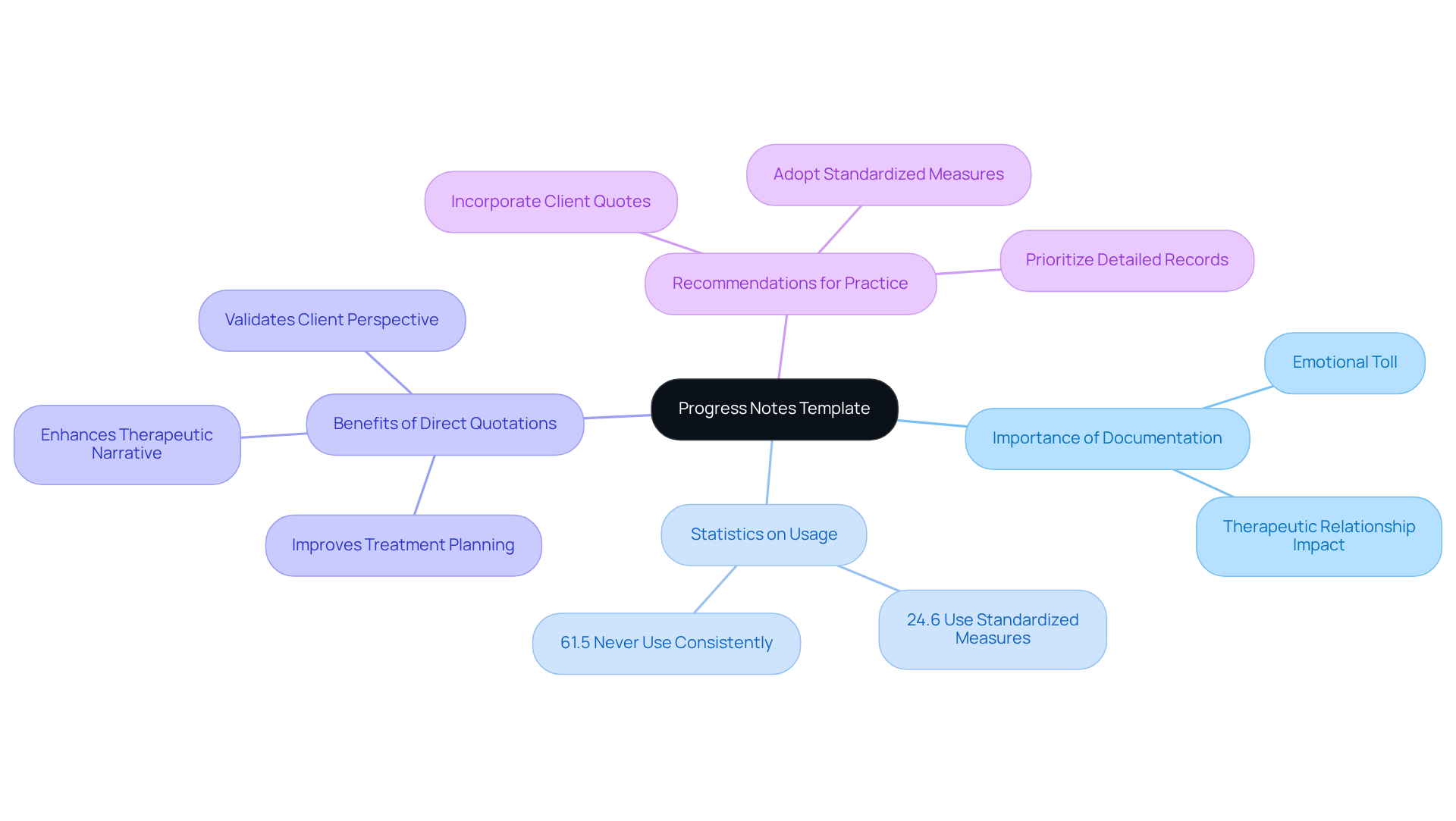
Crisis Intervention Notes Template: Documenting Urgent Situations
are vital tools for documenting urgent situations that call for immediate action. These templates empower practitioners to systematically capture critical details about the crisis, including the nature of the incident, the interventions applied, and the individual's responses. By ensuring that all relevant information is documented, therapists can facilitate and enhance the effectiveness of future sessions.
emphasize being concise yet thorough, focusing on observable behaviors, and clearly outlining the interventions used. Incorporating direct quotes from individuals can also provide valuable insights into their emotional state, enriching the . For instance, a client might express feelings of anxiety during a crisis, stating, "I can't sleep at night thinking about all the ways I could mess up." Such quotes not only validate the individual's experience but also serve as a reference for future treatment planning. This practice demonstrates to clients that you actively listen to and value their words, fostering a deeper level of trust and connection.
Statistics reveal the importance of ; about 45% of individuals with , often due to insufficient records. Moreover, 63% of people with a history of mental illness do not receive care while imprisoned, underscoring the significance of efficient record-keeping in crisis situations. By utilizing a , mental health professionals can improve their , ensuring that urgent situations are addressed promptly and effectively.
Real-world examples illustrate the impact of thorough documentation during therapy crises. For instance, a therapist might record an individual's panic attack, detailing the symptoms observed and the coping strategies employed. This organized method not only aids in but also contributes to monitoring the individual's progress over time. Additionally, can simplify the process of capturing and organizing client quotes, enhancing record-keeping efficiency.
In summary, free therapy notes templates for crisis intervention are invaluable for therapists navigating urgent situations. By following best practices and including patient quotes, mental health professionals can improve their documentation, ultimately leading to better outcomes and a more effective therapeutic process.
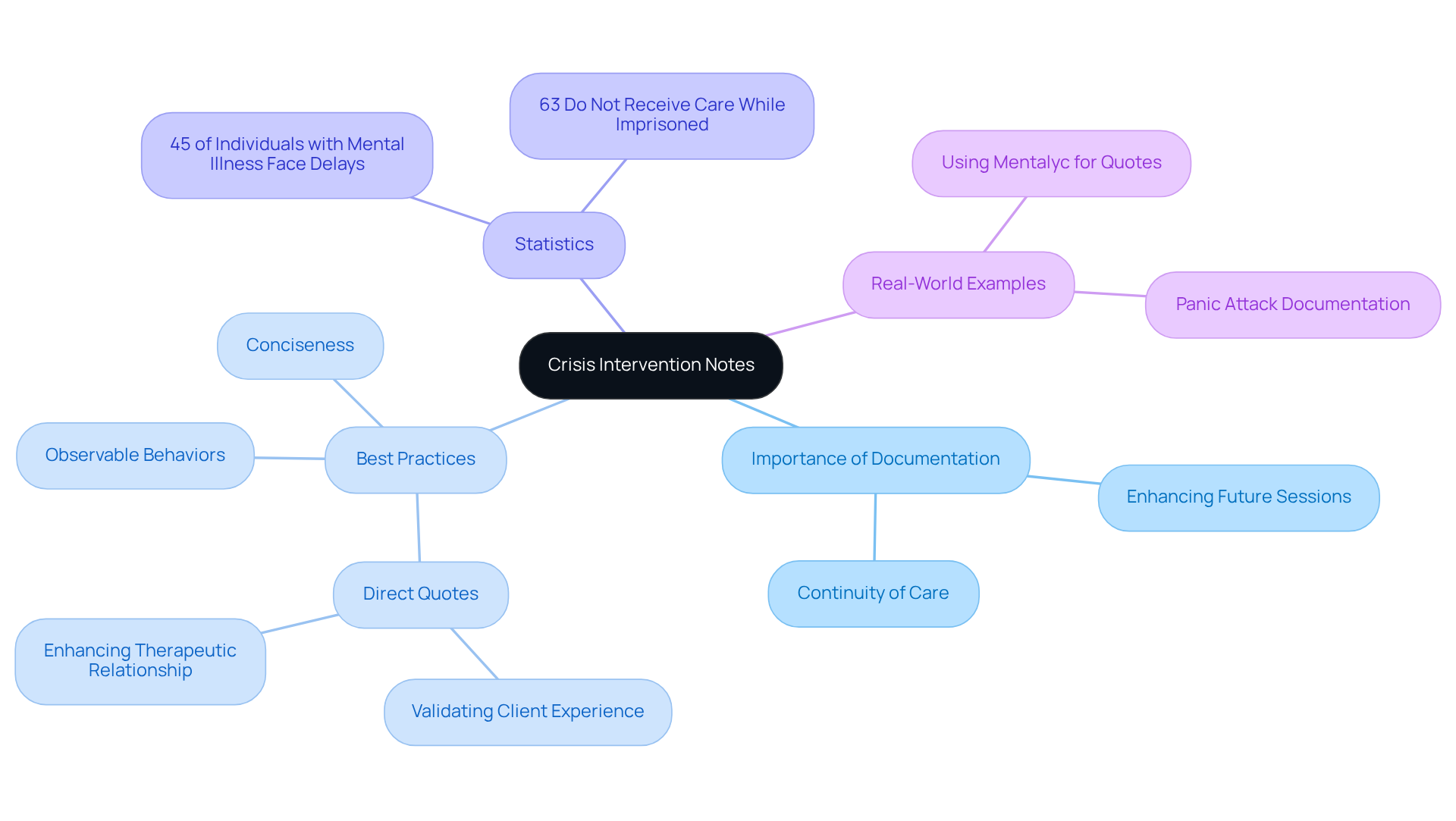
Initial Client Session Notes Template: Establishing Baselines for Therapy
templates play a vital role in capturing the initial interactions with a customer. These records are more than just notes; they encompass , present concerns, and preliminary evaluations. Establishing this foundation is crucial for and , as it allows us to understand and address the .
Have you ever felt overwhelmed by the that come with ? It's a common challenge in the healthcare field, and it can impact the quality of care we provide. By prioritizing thorough documentation, we not only but also enhance our ability to connect with our clients on a deeper level.
As we navigate these responsibilities, let us remember the benefits of . It empowers us to create tailored treatment plans that resonate with our clients' experiences. Together, we can foster an environment where every individual feels heard and supported. Let's embrace these practices and continue to engage with our clients compassionately.
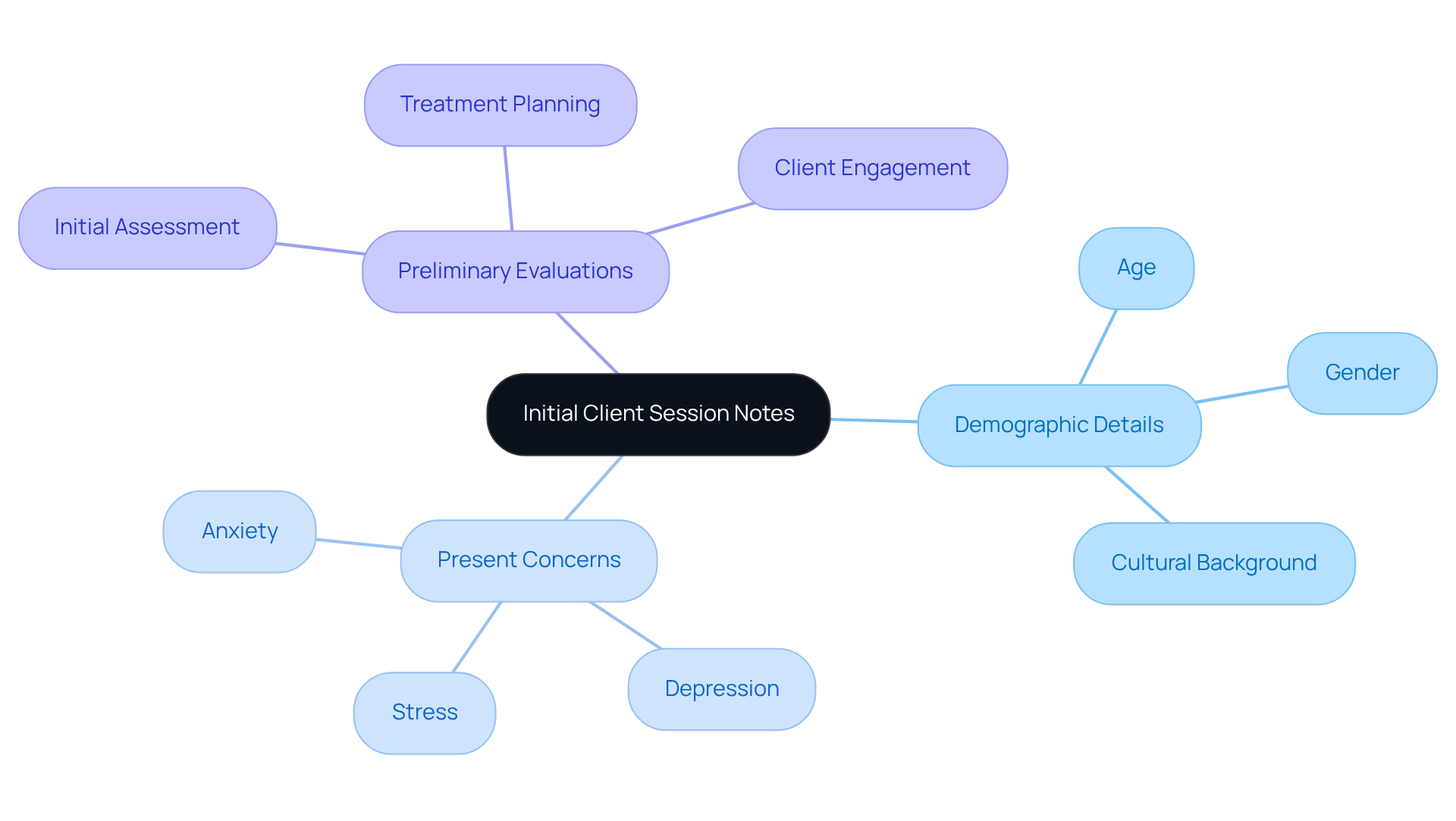
Ongoing Session Progress Notes Template: Maintaining Continuity in Care
Current session progress notes templates, such as a , serve as vital resources for documenting the intricacies of each therapy session. They capture , the challenges faced, and necessary adjustments to treatment plans. This thorough record-keeping is essential for ensuring , allowing all providers involved in a patient's treatment to remain well-informed and aligned in their approach.
Have you ever considered how higher continuity of care can ? Research shows that it leads to reduced symptom severity and improved social functioning. For instance, a cohort study revealed that patients with consistent treatment contacts experienced better outcomes compared to those with sporadic care. This underscores the importance of .
To foster effective continuous session record-keeping, consider these optimal methods:
- Take thorough notes on participant interactions.
- Employ (Subjective, Objective, Assessment, Plan) to ensure clarity and consistency.
- Include direct quotations from clients to provide insights into their emotional states and progress.
As one healthcare provider wisely stated, "If it’s not documented, it didn’t happen!" This highlights the critical nature of in therapy.
Moreover, statistics reveal that 30% of adolescents aged 12 to 17 received in 2022, pointing to a significant gap in care for many. By implementing , professionals can better monitor progress and ensure that treatment plans are responsive to evolving needs. Ultimately, continuous session progress records not only enhance individual client care but also contribute to the overall effectiveness of mental health services. Let's work together to ensure that every client receives the care they deserve.
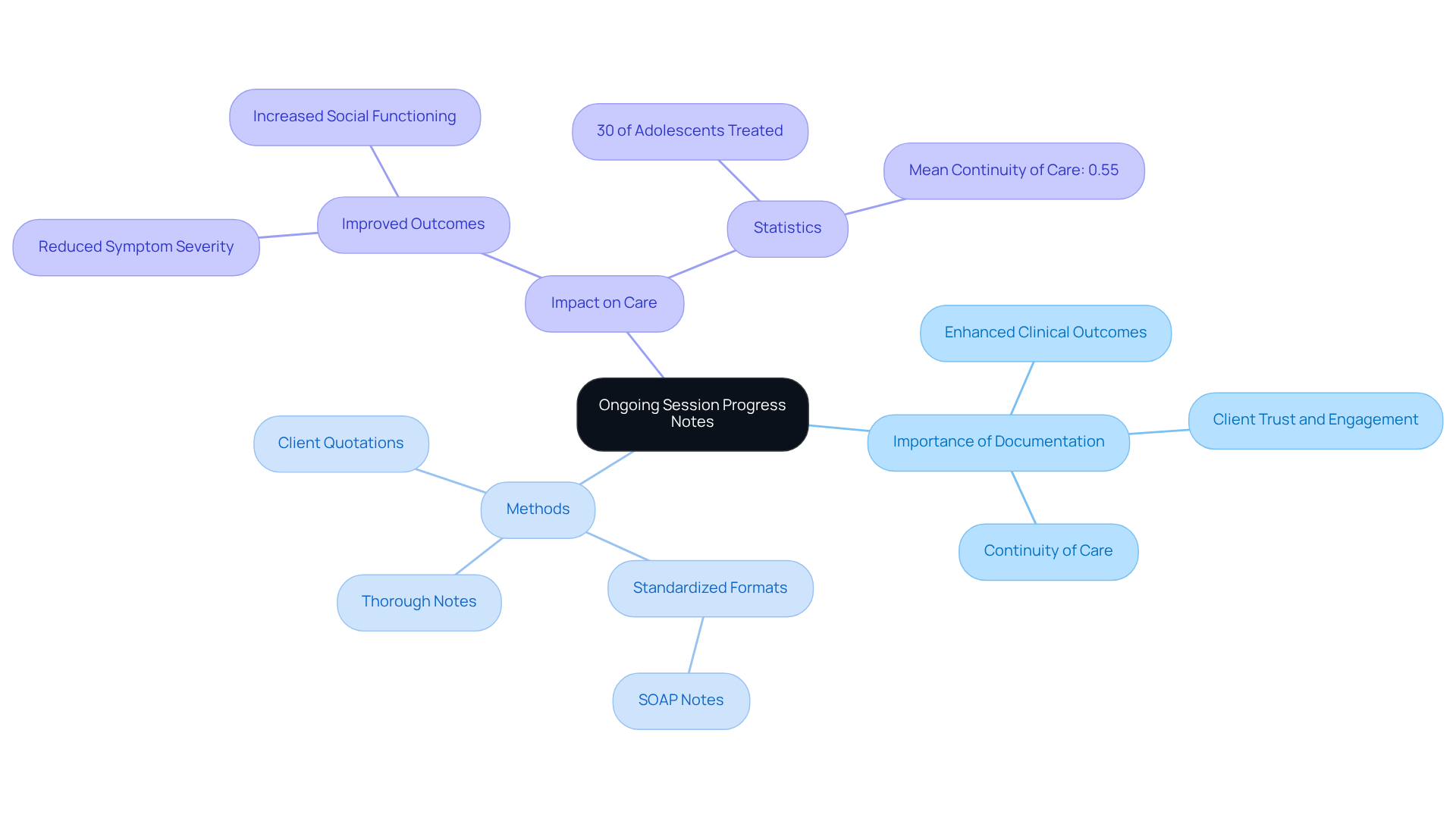
Printable Therapy Notes Template: Convenient Documentation for Therapists
Professionals can use a as a compassionate solution for efficiently documenting sessions with printable therapy templates. These templates can be printed and filled out by hand, catering to those who prefer a for their notes. This method not only ensures that all essential information is captured but also aligns with the preferences of many practitioners who cherish the tactile experience of writing.
Have you ever felt overwhelmed by ? Statistics indicate that a significant number of practitioners favor physical , believing it enhances their focus during sessions. For instance, professionals using often report improved organization and clarity in their notes, which is vital for effective treatment planning when utilizing a free therapy notes template. In fact, those utilizing TextExpander save an average of 6 to 10 hours each week on record-keeping tasks, underscoring the of employing templates.
Real-life examples further illustrate the advantages of using printable templates. One counselor shared that having a physical document makes it easier to reference during sessions, minimizing interruptions and allowing clients to express themselves freely. Another therapist noted that printed templates have streamlined their record-keeping process, freeing up valuable time for patient care. A Pediatric Nurse Practitioner also emphasized the ease of use, stating that the program has significantly improved their record-keeping efficiency.
Moreover, integrating customer quotes into these templates can enrich the records, providing deeper insights into the therapeutic journey. Therapists are encouraged to include during sessions, which not only validate individuals' voices but also enhance the overall quality of care.
In summary, a free therapy notes template is not only convenient but also a striving to methods while nurturing a personal connection in their client interactions. Proper records are essential for tracking progress and fulfilling ethical and legal obligations in therapy. Embrace the support these templates offer, and consider how they can transform your practice.
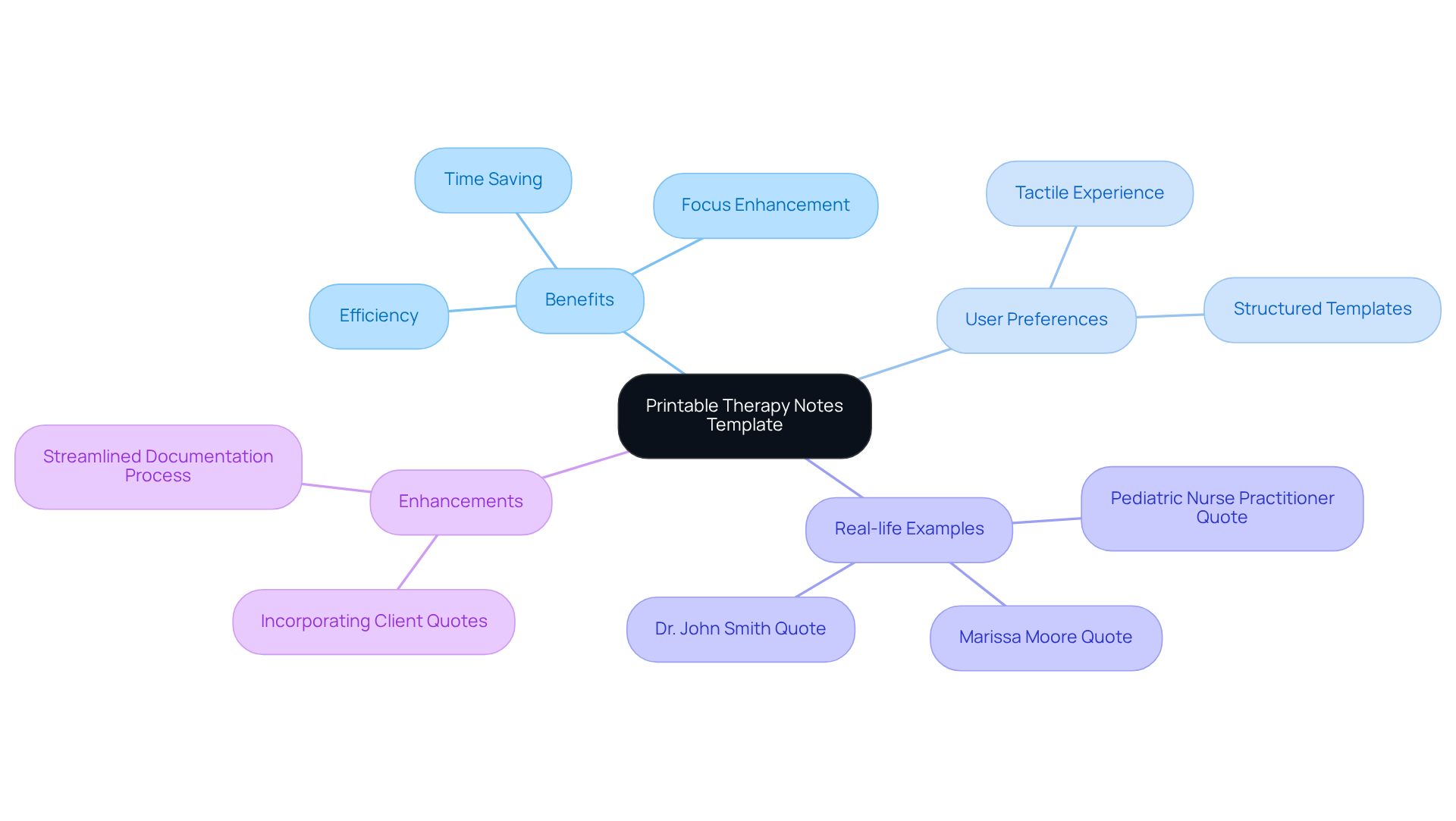
Workflow Efficiency: Benefits of Using Therapy Notes Templates
Therapists often face overwhelming that can detract from their primary focus: . Utilizing a can significantly alleviate these challenges, enhancing . notes templates simplify , conserve valuable time, and reduce the risk of errors, allowing clinicians to dedicate more attention to their patients. Research shows that using can decrease record-keeping time considerably, with some platforms reducing the average time for progress notes from 12-15 minutes to just 6-7 minutes per note. This efficiency not only improves accuracy but also fosters a more compassionate and engaged therapeutic environment.
Real-world examples illustrate the positive impact of these templates. In a quality improvement initiative with neurology residents, those utilizing standardized templates documented critical patient information more consistently. This led to more meaningful discussions about lifestyle changes and mental health. The group using templates achieved a remarkable 92% recording rate for driving status in patients with seizures, compared to only 53% in the non-template group, underscoring how templates enhance .
Healthcare specialists have noted that integrating technology into record-keeping promotes a more efficient workflow. As A. Breithaupt emphasized, 'standardized templates created for particular disorders can enhance adherence to without prolonging the time spent on records.' This balance of efficiency and quality is vital in today’s fast-paced healthcare environment. By adopting a free therapy notes template, therapists can reclaim precious time, ultimately enriching the quality of care they provide.
Are you ready to embrace this change? Consider how implementing these templates can transform your practice and enhance your connection with patients.
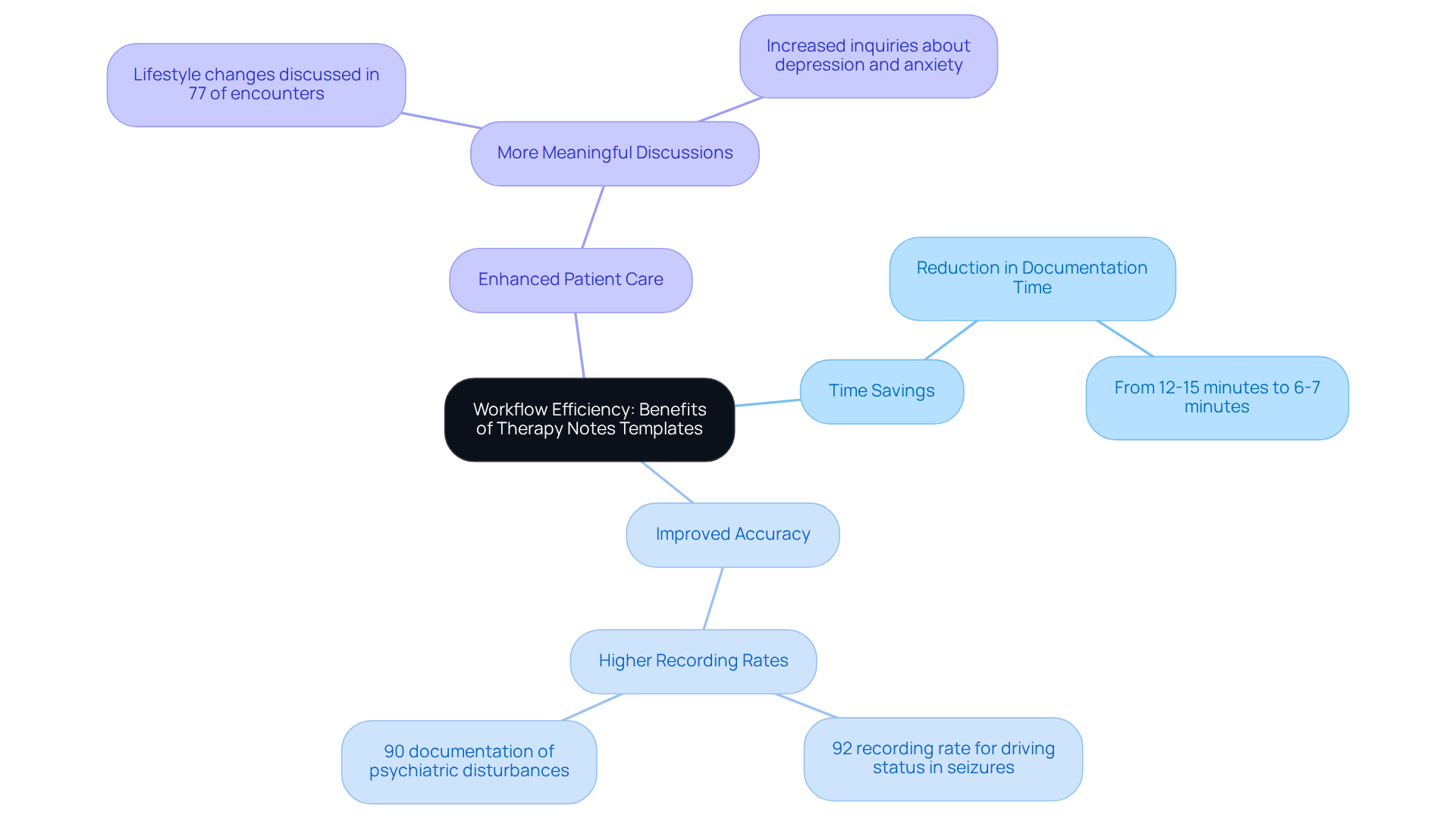
Conclusion
Utilizing free therapy notes templates can profoundly enhance the efficiency and effectiveness of documentation in therapeutic practices. These templates not only streamline administrative tasks but also empower therapists to focus more on their patients, ensuring that the quality of care remains a top priority. By adopting such tools, healthcare providers can alleviate the burdens of documentation, fostering a more compassionate and engaged therapeutic environment.
Throughout this article, we have explored various templates such as SOAP, BIRP, DAP, and others, each offering unique advantages for different aspects of therapy documentation. Have you considered how structured formats can improve treatment planning and continuity of care? These invaluable resources facilitate better tracking of patient progress, allowing for deeper connections with clients. The integration of direct quotes from clients and the emphasis on thorough record-keeping further enhance the therapeutic relationship, nurturing a stronger bond and understanding.
In light of the compelling benefits highlighted, it is essential for therapists to consider adopting these free therapy notes templates. Embracing these tools can significantly improve workflow efficiency and elevate the overall quality of care provided to clients. By prioritizing effective documentation practices, mental health professionals can ensure that each individual receives the personalized support they deserve, ultimately leading to better therapeutic outcomes. So, why not take the step today towards a more efficient and compassionate practice?




